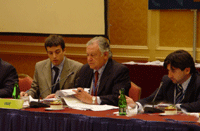Discurso del Director Nacional y Presidente del SCCP, Sr. Raúl Allard en la inauguración de la 1ª Reunión del Subcomité de Procedimientos Aduaneros de APEC 2004.
OPENING REMARKS BY MR. RAUL ALLARD, SCCP CHAIRMAN AND NATIONAL DIRECTOR OF CUSTOMS, TO THE FIRST 2004 APEC SCCP MEETING

|
Ladies and Gentlemen:
First of all, the Minister of Finance, Mr. NICOLAS EYZAGUIRRE,
sends his message of support to this Subcommittee, wishing the success
in our deliberations and also conveys his apologies for not being with
us today in the Opening Ceremony due to his Ministerial obligations.
As
the host of this SCCP Meeting, I cordially welcome all of you and wish
you a pleasant stay in Santiago, our Capital City. On behalf of my
staff, I would like to offer you any assistance you may require during
this week.
Chile, our people, the Government and the
Customs Service are all very proud to be host of APEC 2004. As a
democratic society with an open economy, over 4.200 kilometers of
coastline in the Pacific and proximate to our Bicentennial Anniversary
as a Nation in the year 2010, we recognize that the partnership with
other Economies of the Pacific Basin Region, within the framework of
APEC, is a priority.
There is no doubt that APEC is an
important forum. The figures are impressive: APEC Economies represent
60% of the world population, almost half of the GNP and 47% of the
foreign trade.
Increasing Trade in the APEC Region. From
the beginning, APEC has worked to reduce tariffs and other trade
barriers across the Asia-Pacific region, promoting efficient domestic
economies and increasing exports. Key to achieving APEC’s vision are
the “Bogor Goals” of free and open trade and investment in the
Asia-Pacific by 2010 for industrialized economies and 2020 for
developing economies.
Customs is a sector particularly
adapted to the internationalization of its rules and procedures, a
highly important factor in an era of globalization of trade, but also
of culture, technology and information. Customs are key actors in these
policies of increasing trade and free trade.
Within
this context, this Sub-Committee has been organized, in my opinion, as
a very structured area within APEC and the CTI, with its own programs
and cooperation, mainly through 14 CAP’s , in the first or second stage.
We
are just completing this year, the first decade of the SCCP. We can
draw from a rich experience of interactions and mutual technical
assistance. We have enjoyed a high degree of continuity in our actions,
as was symbolized in the very interesting meetings that took place last
year in Chiang Mai and Phuket, Thailand.
The fact that
21 Economies have registered to this event is a record that shows that
our subfora is dynamic and useful to Governments and Customs.
We
have been able to define broad and ambitious objectives: to simplify
and harmonize regional Customs procedures to ensure that goods and
services move efficiently, effectively and safely through the region,
reconciling border control and facilitation. We also share basic
principles: Facilitation, Accountability, Consistency, Transparency and
Simplification.
Areas and activities such as enforcement
– including modernization, risk management, security-trade
facilitation, and fast clearance of goods and customs cooperation, are
important in terms of the application of those goals and principles.
The
theme of APEC Chile 2004, ”One Community, Our Future”, stresses the
real opportunities presented to all of us, to strengthen the ties and
links among all the Economies, areas, languages, cultures and
continents, represented in APEC, accepting the differences, but with
this vision of a shared future.
I believe that we, in
the SCCP and Customs, can deliver results in this direction, because
ties among Customs are closer than in other sectors because of the
similarities of their missions, and the “internationalization” factor
that I mentioned above.
The modality of cooperation
through CAP’s, with one, two or three coordinators or “Shepherd”
Economies and mutual interactions, takes advantage of these features of
Customs.
It is time for evaluation, analysis and renewal.
It is also time for reasserting confidence in the future of our
activities and programs, merging continuity and change, in accordance
with our present needs.
These considerations and
challenges arise from our own experience as SCCP, and also from the
suggestions that we have received from the SOM and, in particular, from
the CTI and its Chairman, Mr. Alan Bowman, who will address our meeting
today. At the initiative of the CTI Chairman, and in the framework of
the priorities for this year that he passed on to us, we prepared a
Summary Report of our actions that I delivered to you yesterday.
As you know, those priorities are:
- Support for the WTO
- Trading System, Trade Facilitation
- Transparency
- Structural Reform, and
- Pathfinder Initiatives
There are also other cross cutting issues and objectives such as security and APEC reform and, possibly, FTA’s or RTA’s.
I will offer a few comments on these matters:
Support for WTO and Assisting the Multilateral Trading System:
Several
CAPs involve this area, such as Harmonization of Tariff Structure with
the HS Convention, Adoption of the Principles of the WTO Valuation
Agreement; Adoption of Trade-related Aspects of Intellectual Property
Rights, etc.. In many cases, the goals of the WTO are also ratified and
specified by the WCO, in this area we have guidelines and practical
experiences of cooperation.
Trade Facilitation:
This
principle is subject also of various CAPs and activities: Advanced
Rulings, Adoption of UN/EDIFACT Paperless Trading; Express Consignment
Clearance, Risk Management Techniques, etc.. The Chair considers that
all initiatives that assist in the implementation of trade facilitation
principles are crucial and welcomes further actions that we can
identify, including those aimed to fulfill the Bogor goal of cost
reduction.
Transparency:
This is a relevant
issue for Customs and we will work through CAP’s Customs Integrity and
Adoption of Transparency Standards, and also through activities such as
the Peer Review Program, included in our Agenda.
Any effort on this regard contributes to fulfill the commitments and increase efficiency of the SCCP.
Structural Reform:
APEC
and the SCCP have been active trade related fora during a decade.
During this period many issues have arisen, or have been otherwise
replaced or complemented by the new challenges of today’s global world.
Pathfinder Activities:
The SCCP has identified the Revised Tokyo Convention as an area which the Pathfinder approach might be usefully adopted.
The following cross-cutting issues must be noted:
Security:
Has
become an overwhelming and relevant issue in today’s trading community.
APEC reacted in due time, by accepting the inclusion of the STAR
initiative as a vital element in APEC. The SCCP, together with the
Business Mobility Group, have been identified as key players by the
CTI, in the full implementation and understanding of STAR.
It
is in this context that this chair feels that there is still room for
further discussion within the SCCP itself regarding the STAR
initiative, thus, the SCCP calls upon those Economies that can provide
insight on this issue to do so. The SCCP also invites those member
economies requiring capacity building on this issue to request
assistance, to ensure the success of STAR.
The reform of APEC:
Updating
Working Methods. As mentioned above, this a matter which requires
further consideration in light of the changes that have taken place in
the last years. The SCCP should consider the possibility of updating
its present working methods. It is within this context that yesterday,
I shared with the Chiefs of Delegations in the informal meeting, some
ideas and instruments that look at new ways to accomplish the
Sub-Committee’s goals:
- introducing the more active form of working groups, where applicable,
- short seminars to deal with emerging issues or problems, to be held during SCCP meetings,
- new CAP’s items,
- new types of instruments (or CAPs) with specific objectives to be performed in a given period of time (two or three years),
- in general, to establish networks of interactions among Customs in relevant subject matters.
Thus, we welcome any proposals that may arise in this meeting to implement new methodologies to the work of the SCCP.
Customs
Aspects of FTAs. A new subject matter that is being considered by SOM
and CTI is the FTA or RTA. This matter could be, eventually a new area
of concern for the SCCP in its implications on Customs, such as access
of goods to markets, rules of origin, TRIPS, etc.
Two
of our Economies: Chile and Korea, two geographically distant Nations,
recently approved a FTA that shall enter into force in approximately
one month’s time. In our Agenda we have included a report on FTA’s and
Customs from the Chilean perspective, that could be useful for further
discussions on this matter.
With relation to the internal
affairs and work of SCCP, we must address the self-evaluation of the
Sub-Committee and also a new look to the collective action plans (CAPs)
as a very interesting instrument for Customs interactions. It should be
mentioned that the majority of the Member Economies are beyond stage 1
of implementation, and many have reached the final stages of
implementation, in accordance to their legislation and individual
restraints. Thus, it is important that all SCCP Member Economies obtain
feedback from those Members in the early stages of any given CAP, so as
to facilitate any further assistance required.
Finally,
the SCCP looks forward to new means to develop further activities, to
benefit the less developed Economies, and the trading community as a
whole.
I would like to conclude by saying that our efforts are aimed at ensuring a successful and pro-active meeting that will contribute to achieving the goals set up by APEC, CTI and our own Sub-Committee of modern, efficient transparent and secure services by Customs, through close cooperation between us, and also close interactions with the private sector.










